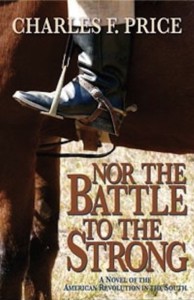 Welcome to my blog. The week of 1–7 July 2011, I’m participating with more than two hundred other bloggers in the “Freedom Giveaway Hop,” accessed by clicking on the logo at the left. All blogs in this hop offer book-related giveaways, and we’re all linked, so you can easily hop from one giveaway to another. But here on my blog, I’m posting a week of Relevant History essays, each one with a Revolutionary War theme. To find out how to qualify for the giveaways on my blog, read through each day’s Relevant History post below and follow the directions. Then click on the Freedom Hop logo so you can move along to another blog. Enjoy!
Welcome to my blog. The week of 1–7 July 2011, I’m participating with more than two hundred other bloggers in the “Freedom Giveaway Hop,” accessed by clicking on the logo at the left. All blogs in this hop offer book-related giveaways, and we’re all linked, so you can easily hop from one giveaway to another. But here on my blog, I’m posting a week of Relevant History essays, each one with a Revolutionary War theme. To find out how to qualify for the giveaways on my blog, read through each day’s Relevant History post below and follow the directions. Then click on the Freedom Hop logo so you can move along to another blog. Enjoy!
Note: I’ll be traveling a bit today, with sporadic access to the Internet mid-day. The posting of some comments may be delayed a few hours.
 Relevant History welcomes author Charles F. Price, a historical novelist living near Burnsville, NC. He has written four books set in his native Southwestern North Carolina. They are Hiwassee: A Novel of the Civil War; Freedom’s Altar; The Cock’s Spur; and Where the Water-Dogs Laughed. He has won the Sir Walter Raleigh Award; a national Independent Publishers Book Award; and two historical fiction awards from the North Carolina Society of Historians. His most recent work is Nor the Battle to the Strong: A Novel of the American Revolution in the South. For more information, check his web site.
Relevant History welcomes author Charles F. Price, a historical novelist living near Burnsville, NC. He has written four books set in his native Southwestern North Carolina. They are Hiwassee: A Novel of the Civil War; Freedom’s Altar; The Cock’s Spur; and Where the Water-Dogs Laughed. He has won the Sir Walter Raleigh Award; a national Independent Publishers Book Award; and two historical fiction awards from the North Carolina Society of Historians. His most recent work is Nor the Battle to the Strong: A Novel of the American Revolution in the South. For more information, check his web site.
*****
As a native Southerner, I was, in my long-ago youth, an enthusiastic student of the Civil War. And while my heritage made it inevitable that I would admire the heroes of the Confederacy, in that bygone day it was also still possible to honor the great figures who strove to save the Union, and I did.
Ever since Appomattox some Southerners have sought to reconfigure the meaning of our great national conflict by insisting that human slavery was not its cause and that its true purpose was to win independence from Yankee Coercion, Northern Aggression, or some other attempt by the North to impose its will on a South determined only to preserve its traditions.
But however one construes these issues, during this Sesquicentennial of what I still insist on calling the Civil War, it seems to me impossible to regard that struggle as anything but an immense tragedy, especially for the South; or to deny that, for our region, it was, and remains in the collective memory, our peculiarly negative contribution to the history of the United States—negative in the sense that it bequeathed us sectional, racial, social and political attitudes that continue to divide some of us even one hundred and fifty years later.
I can already hear some of you out there tapping outraged counter-arguments, but before you continue, allow me to assert my pride in the Confederate service of my great-great grandfather Oliver Price and my great-great-uncles Andrew, Jack and Howell Curtis. Jack and Howell gave their lives in that service and Andrew died in an insane asylum as a result of what we would call post-traumatic stress disorder. Oliver Price served through the war only to be wounded in one of its last engagements, the battle of Bentonville in eastern North Carolina.
Some of you may know that my respect for my Confederate ancestors is so great that I devoted my first four novels to their lives and the lives of their families during and after the Civil War. I hope anyone who has been offended by my preliminary remarks will read those books before arraigning me as someone hostile to the notion of Southern honor.
Of course it’s not my purpose, during this celebration of our National Independence, to stir up divisive old animosities. On the contrary, those of us contributing to Suzanne’s blog during these special days are instead celebrating the memory of the American Revolution—the only successful, enduring national revolution in world history that has continued to grow and flourish over time by re-inventing, re-interpreting and striving always to perfect the essential values laid down by its Founders.
So here is my argument: The South won the War of the American Revolution. It is that achievement which represents its finest and most positive contribution to American history. It was that belief, confirmed by long and intense study, that led me to write my most recent work of historical fiction, Nor the Battle to the Strong: A Novel of the American Revolution in the South. I hope it won’t diminish the seriousness of my theory if I confess that my wife and wise collaborator Ruth devised a promotional handout when the book debuted in 2008 poking a bit of fun at the persisting (and competing) popularity of Civil War fiction. Its title was, “Why Not Read About the War the South Won?”
If the claim sounds extreme, pause and consider the history. The Revolutionary War stalemated in the North after the French alliance and the battle of Monmouth. The British then unveiled their Southern Strategy, believing Loyalist support in the region and alliances with Native Americans would help them reclaim Virginia, North and South Carolina and Georgia. Success in the South would then allow them either to sweep northward on a tide of victory and defeat George Washington or, under less propitious circumstances, approach the peace table and, by the principle of uti possedetis, at least hold the Southern colonies for England.
This strategy succeeded admirably at first with the fall of Savannah and then of Charleston, the conquest of South Carolina and the defeat of General Gates’ American army at Camden. But then, owing to incessant attacks by Southern partisans like Marion, Sumter, Pickens and Davie, together with the battlefield victories of the Overmountain Men at Kings Mountain and Daniel Morgan at The Cowpens, fortune began to turn against Cornwallis.
The decisive event of the Southern War was George Washington’s appointment of Major General Nathanael Greene to the command vacated by Gates. Greene, a Rhode Island-born ex-Quaker, self-taught in military affairs, proved an adroit and wily strategist. So thoroughly did he outmaneuver and exhaust the army of Cornwallis in North Carolina that—though the Earl won the engagement at Guilford Courthouse—his force was virtually incapacitated and he chose, rather than try conclusions again with Greene, to limp off to Wilmington to lick his wounds. Eventually he marched north into Virginia to meet his fate at Yorktown in October, 1781.
Americans are generally taught that the surrender of Cornwallis ended the Revolution. This is untue; Greene’s Southern army, suffering defeat after defeat at places like Ninety-Six, Hobkirk’s Hill and, debatably, Eutaw Springs, still, by stubborn perseverance and in the face of terrible want, during late 1781 and all of 1782 succeeded in winning back the Southern colonies and penning up the British in Charleston and Savannah, where they languished until their government began to seek a peace based on American independence. It is this story that I tell in my forthcoming book The Sunshine of Better Fortune.
Victory was the South’s gift to the thirteen colonies struggling to become a nation. That deserves to be remembered but instead has largely been forgotten, even by Southerners who should know better. The Civil War stands like a wall across Southern memory. If we can climb that wall and look eighty years farther into the past, we will see glory. We should honor it.
*****
 A big thanks to Charles Price. He’ll give away a print copy of Nor the Battle to the Strong to someone who contributes a legitimate comment on my blog today or tomorrow. Make sure you provide your email address. I’ll choose one winner from among those who comment on this post by Sunday 3 June at 6 p.m. ET, then publish the name of the winner on my blog the week of 11 July. Delivery is available within the U.S. only.
A big thanks to Charles Price. He’ll give away a print copy of Nor the Battle to the Strong to someone who contributes a legitimate comment on my blog today or tomorrow. Make sure you provide your email address. I’ll choose one winner from among those who comment on this post by Sunday 3 June at 6 p.m. ET, then publish the name of the winner on my blog the week of 11 July. Delivery is available within the U.S. only.
**********
Did you like what you read? Learn about downloads, discounts, and special offers from Relevant History authors and Suzanne Adair. Subscribe to Suzanne’s free newsletter.
